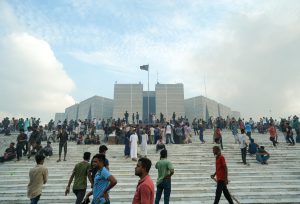Parallels between the economic and democratic trajectories – or the lack thereof – of Bangladesh and Sri Lanka have long been noted by external experts. In a 2022 ANI interview, which has recirculated in light of the recent mass uprising in Bangladesh, a reporter asked longtime Prime Minister Sheikh Hasina if she foresaw the country facing a “Sri Lanka-type crisis.” Hasina was quick to dismiss the concerns with a brief “Not exactly.” However, when recent videos of Bangladesh’s mass protests emerged, showing demonstrators storming the Ganabhaban, it echoed the Sri Lankan protesters who stormed the presidential palace in 2022.
For the past 15 years, Bangladesh, like Sri Lanka under the Rajapaksa family, has been governed by the Awami League. Both countries have experienced authoritarianism under dynastic rule, characterized by rampant corruption, nepotism, and extravagant projects designed to distract citizens from issues such as debt and money laundering. Both the Sheikh and Rajapaksa families built their political empires on their families’ wartime leadership stories, with little else to bolster their legitimacy as current political leaders.
Hasina might have failed to see the parallels to Sri Lanka and predict the outcome of her authoritarian rule, but we can still derive lessons from the aftermath of the Aragalaya to ensure the reformation of Bangladesh’s democracy.
In Sri Lanka, protests against the government began from March 2022, ignited by a severe economic crisis. Citizens were experiencing power cuts and fuel, food, and medicine shortages, along with rising costs of living. This uprising, known as “Aragalaya” or “people’s struggle,” derived from the Sinhala word, highlighted the people’s dissatisfaction.
The demand of the Sri Lankan protesters was simple: They wanted President Gotabaya Rajapaksa and the Rajapaksa family to resign. At the peak of the protests, these demands were met, and it seemed like a political transformation was on the horizon in Sri Lanka. However, what the Aragalaya lacked was a proper long-term reformation plan.
With corruption entrenched in the political landscape, Ranil Wickremesinghe was elected president in place of Rajapaksa. His primary aim was to dismantle the movement, which he achieved through further police crackdowns and propaganda campaigns that discredited the protesters. What began as a movement that united the nation slowly started to die down as the protesters were forced to resume their normal lives.
Under the guise of restoring normalcy, Wickremesinghe began easing economic tensions, and two years later, the country seems to be making a slow but steady economic recovery. But no heed has been paid to the democratic concern or restoring trust between the citizens and government leaders.
In a BBC news article, Swasthika Arulingam, a human rights lawyer, called the movement unorganized. She pointed out that “we have not achieved the long-term goals of Aragalaya… [there has been] no change in the political system, no accountability on corruption, and those who are responsible for stealing people’s money are still in power.”
To top it all off, blows to Sri Lankan democracy continue. This year, the government passed the Online Safety Act that strictly regulates all online content. To further ensure that citizens are unable to organize and create a second Aragalaya, the government continues to utilize repressive laws like the Prevention of Terrorism Act (PTA) to dismantle demonstrations and detain protest leaders.
At the critical juncture where Sri Lanka veered off course, Bangladesh needs to continue moving toward complete democratic reform.
Throughout her tenure, Hasina systematically eliminated her political rivals and brought all branches of the Bangladeshi government under her control. The challenge that both citizens and the interim government face is addressing her pervasive influence, which remains entrenched in the government she left behind. Her affiliates still occupy various positions, necessitating a thorough administrative restructuring – a process already underway. Without this, the state will not be able to restore trust in any future electoral processes. The opposition party, the Bangladesh Nationalist Party (BNP), is already demanding elections. But without implementing proper reforms, another electoral process at this stage will throw Bangladesh in the same pool as Sri Lanka.
Equally important is the need to pursue due process to bring justice for the indiscriminate killings by the state and the corruption that was overlooked during Hasina’s rule. This sentiment has been echoed by both the Chief of Army Staff, General Waker-uz-Zaman, and the advisers of the newly appointed interim government.
What makes Bangladesh’s situation unique is the interim government’s decision to include two student coordinators from the anti-discrimination student movement. This inclusion ensures that the concerns of the younger generation, the largest demographic in the country, are highlighted. However, concerns have been raised by the general public about the lack of transparency in the decision-making processes between the student coordinators and the rest of the interim government’s advisers. These issues need to be addressed in the future.
While we celebrate newfound democratic freedoms, we must not overlook the existence of the Cyber Security Act (CSA) in Bangladesh, which bears a stark resemblance to Sri Lanka’s Online Safety Act. In a democratic country, freedom of expression should not be stifled by such legislation.
The interim government has assured its citizens that upholding human rights will be their primary focus. However, we must remain vigilant and hold them accountable when they falter. Only through state transparency, accountability, and press freedom can we ensure a democratic future for our nation.

































